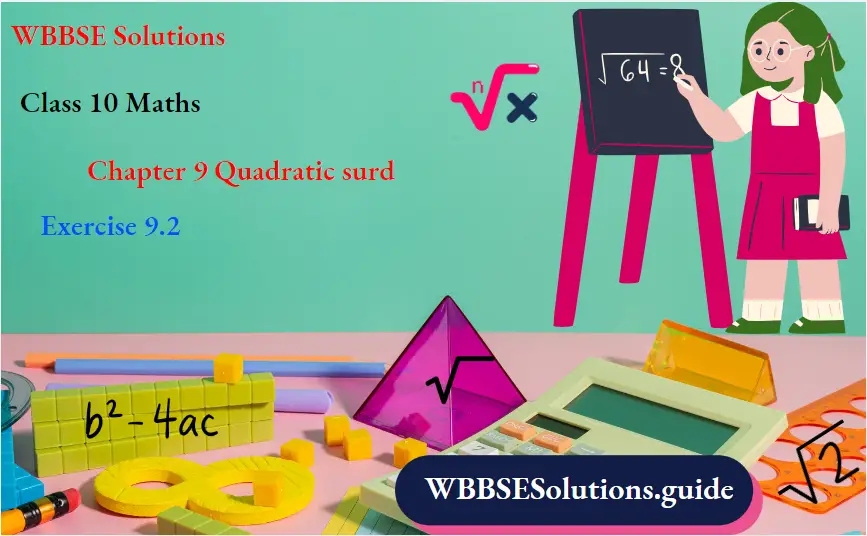WBBSE Solutions For Class 10 Maths Chapter 9 Quadratic surd Exercise 9.2
Question 1:
1. Let us find the product of 3 and √3.
Solution: 31/2 x √3
= 31/2 x 31/2 = 31/2+1/2 = 31 = 3.
Read and Learn More WBBSE Solutions For Class 10 Maths
2. Let us write what should be multiplied by 2√2 to get the product 4.
Solution: Required Number = 4/2√2
= 2 x 2 /2√2
=2/√2
=2.√√2/√2.√2
=2√2/2
=√2
“WBBSE Class 10 Maths Quadratic Surd Exercise 9.2 solutions”
3. Let us calculate the product of 3√5 and 5√3.
Solution: 3√5×5√3
=3×5 x√5 × √3
= 15√15
The product of 3√5 and 5√3 = 15√15
4. If √6 x √15 =x√10, then let us write by calculating the value of x.
Solution: If √6 x √15
= x√10
or, √90 = x√10
or, √9x√10=x.√10
∴ x = √9 = 3
The value of x = 3

5. If (√5+ √3) (√5-√3) = 25-x2 is an equation, then let us write by calculating the value of x.
Solution: If (√5+√3) (√5-√3)
= 25 – x²
Or, (√5)²-(√3)²
= 25-x2
or, 2=25-x²
or, x² = 25-2 = 23
∴ x = ±√23
The value of x = ±√23
“West Bengal Board Class 10 Maths Chapter 9 Quadratic Surd Exercise 9.2 solutions”
Question 2:
1. √7 x √14
Solution: √7x√14 = √7x√7×2 = √7× √7×√2
= 7√2
√7x√14 = 7√2
2. √12 x 2√3
Solution: √12×2√3 = √2×2×3×2√3 = 2√3×2√3 =2x2x√3.√3
= 4 x 3
=12
√12×2√3 =12
3. √5 x √15 x √3
Solution: √5x√15x√3
= √15x√15 √15×15
= 15
√5x√15x√3 = 15
4. √2x (3+ √5)
Solution: √2x(3+√5) = 3√2+√2 × √5 = 3√2+√10
5. (√2+ √3) (√2 – √3)
Solution: (√2+√3)(√2-√3) = (√2)-(√3) 2-3-1
“WBBSE Class 10 Quadratic Surd Exercise 9.2 solutions explained”
6. (2√3 +3√2) (4√2 + √5)
Solution:
(2√3+3√2) (4√2+√5)
=8√6+2√15+12√4+3√10
=8√6+2√15+12.2+3√10
=8√6+2√15 +24+3√10
(2√3+3√2) (4√2+√5) =8√6+2√15 +24+3√10
7. (√3+1) (√3-1) (2-√3) (4+2√3)
Solution : (√3+1)(√3-1) (2-√3) (4+2√3)
= {(√3)2 -(1)2} (2−√3) (4+2√3)·
=(3-2) (2-√3) × 2(2+√3).
=2×2×(2-√3) (2+√3)
= 4x {(2)² – (√3)²}
= 4x (4-3)
= 4 × 1
= 4
(√3+1)(√3-1) (2-√3) (4+2√3) = 4
“WBBSE Class 10 Maths Exercise 9.2 Quadratic Surd problem solutions”
Question 3:
1. If √x is the rationalizing factor of √5, let us write by calculating the smallest value of x (where x is an integer).
Solution: x = √5
2. Let us calculate the value of 3 √2 ÷ 3.
Solution: 3√2 ÷ 3
= 3√2/3
=√2
3. Let us write which smallest factor we should multiply with the denominator to rationalize the denominator of 7 ÷ √48.
Solution: 7÷ √48
= 7/√48
= 7/√4x4x3
= 7/4√3
Required smallest factor = √3
4. Let us calculate the rationalizing factor of (√5+2) which is also its conjugate surd.
Solution: (√5+2)
The conjugate surd of (√5+2) is 2- √5.
5. If (√5+ √2) ++ √7 = 1/7(√35 + a), let us calculate the value of a.
Solution: (√5+√2) ++√7 = 1/7(√35+a)
If √5+ √2 /7 =√35+a/7
=(√5+√2)√7 / √7 x √7 = √35+a/7
Or, √35+ √14/7 = √35+a/7
Or, √35+ √14 = √35+a
∴ a = √14
6. Let us write a rationalizing factor of 5/√3-2 which is not its conjugate surd.
Solution: 5/√3-2
The rationalizing factor of the denominator of 5/√3-2 is (√3+2).
Question 4. Let us write the conjugate surds of mixed quadratic surds (9-4√3) and (-2 -√7).
Solution: Conjugate surd of (9-4√5) is (9+4√5)
& conjugate surd of (-2-√7) is (-2+√7).
5. Let us write two conjugate surds of each of the mixed quadratic surds given below.
1. √5+ √2
Solution: √5+√2
Two conjugate surds of √5+ √2 are (√5-√2) & (√5+√2).
2. 13+ √6
Solution: 13+ √6
Two conjugate surds of 13+ √6 are (13-√6) & (-13+ √6).
3. √8-3
Solution: √8-3
Two conjugate surds of √8-3 are (- √8-3) & (√8+3).
4. √17-√15
Solution: √17-√15
Two conjugate surds of √17-√15 are (√17 + √15) & (-√17 – √15).
6. Let us rationalize the denominators of the following surds
1. 2√3+3√2 / √6
Solution: 2√3+3√2/√6
=(2√3+3√2) x √6/ √6 x √6
= 2√18+3√12/6
=2×3√2+3×2√3 / 6
=6√2+6√3 / 6
= 6(√2+√3)/6
=√2 + √3
2√3+3√2/√6 =√2 + √3
“Class 10 WBBSE Maths Exercise 9.2 Quadratic Surd step-by-step solutions”
2. √2-1+√6 / √5
Solution: √2-1+√6/√5
= (√2-1+ √6)x√5 / √5 x √5
= √10-√5+√30 / 5
√2-1+√6/√5 = √10-√5+√30 / 5
3. √3-1 / √3+1
Solution: √3-1 / √3+1
= (√3+1)(√3+1) / (√3-1)x(√3+1)
= 3+1+2√3 / 3-1
=4+2√3 / 2
=2(2+√3) / 2
= (2 + √3)
√3-1 / √3+1 = (2 + √3)
4. 3+√5 / √7-√3
Solution: 3+√5 / √7-√3
= (3+√5) (√7 + √3) / (√7-√3) (√7 + √3)
= 3√7+√35+3√3+ √15 / (√7)²-(√3)²
= 3√7+√35+3√3+ √15 / 7-3
= 3√7+√35+3√3+√15 / 4
3+√5 / √7-√3 = 3√7+√35+3√3+√15 / 4
5. 3√2+1 / 2√5-1
Solution: 3√2+1 / 2√5-1
(3√2+1)x(2√5+) / (2√5-1)(2√5+1)
= 6√10+3√2+2√5+1 / (2√5)² – (1)²
=6√10 +3√2+2√5+1 / 4×5-1
6√10+3√2+2√5+1 / 19
3√2+1 / 2√5-1 = 6√10+3√2+2√5+1 / 19
6. 3√2+2√3 / 3√2-2√3
Solution: 3√2+2√3 / 3√2- 2√3
= (3√2+1)x(3√2+2√3) / (3√2-2√3) (3√2+2√3)
=9×2+6√6+6√√6+4×3 / (3√2)²-(2√3)²
= 18+12√6+10 / 9×2-4×3
30+12√6 / 18-12
6(5+2 5+2√3) / 6
=5+2√3.
3√2+2√3 / 3√2- 2√3 =5+2√3.
“WBBSE Class 10 Chapter 9 Quadratic Surd Exercise 9.2 solution guide”
7. Let us divide first by second and rationalize the divisor.
1. 3√2 + √5, √2+1
Solution : 3√2+√5 / √2+1
= (3√2+√5)x(√2-1) / (√2+1)x(√2-1)
= 3×2-3√2+√10-√5 /(√2)² – (1)²
= 6-3√2+√10-√5 / 2-1
=6-3√2+√10-√5 Ans.
3√2+√5 / √2+1 =6-3√2+√10-√5
2. 2√3-√2, √2-√3
Solution:
= 2√3-√2 – √2-√√3
=(2√3-√2)x(√2+√3) / (√2-√3)x (√2+√3)
= 2√6+2×3-2-√6 / (√2)-(√3)
= √6+6-2 / -1
= √6+4 / -1
= -(√6+4)
2√3-√2 – √2-√√3 = -(√6+4)
3. 3+√6, √3+√2
Solution: 3+√6 / √3+√2
= (√3+√6) (√3-√2) / (√3+√2) (√3-√2)
= 3√3-3√2+√18-√12 / (√3)²-(√2)²
= 3√3-3√2+3√2-2√3 / 3-2
=√3
3+√6 / √3+√2 =√3
Question 8:
1. 2√5+1 / √5+1 – 4√5-1 / √5-1
Solution: 2√5+1 / √5+1 – 4√5-1 / √5-1
= (2√5+1)(√5-1) – (4√5-1√5+1) / √5+1 √5-1
= (2×5-2√5+√5-1)-(4×5+4√5-√5-1) / (√5)²-(1)²
= 10-√5-1-20-3√5+1 / 5-1
= -10-4√5 / 4
= 2(-5-2√5) / 4
= (-5-2√5) / 2
2√5+1 / √5+1 – 4√5-1 / √5-1 = (-5-2√5) / 2
2. 8+3√2 / 3+√5 – 8-3√2 / 3-√5
Solution: 8+3√2 / 3+√5 – 8-3√2 / 3-√5
=(8+3√2 3-√5)-(8-3√2)(3 -+√5) / (3+√5) (3-√5)
=(24-8√5+9√2-3√10)-(24+8√5-9√2-3√10) / (3)²-(√5)²
=24-8√5+9√2-3√10-24-8√5+9√2+3√10 / 9-5
18√2-16√5 / 4
2(29√2-8√5) / 2
= 9√2-8√5 / 2
8+3√2 / 3+√5 – 8-3√2 / 3-√5 = 9√2-8√5 / 2
Question 9. 3√20+2√28+ √12 / 5√45+2√175+√75
Solution: 3√20+2√28+√12 / 5√45+2√175+√75
= 3x√2x2x5+2√2x2x7 +2√2x2x3 / 5√3x3x5 +2√5x5x7 + √5x5x3
= 6√5+4√7+4√3 / 15√5+10√7+5√3
= 2(3√5+2√7+√3) / 5(3√5+2√7+√3)
= 2/5
3√20+2√28+√12 / 5√45+2√175+√75 = 2/5
“West Bengal Board Class 10 Maths Exercise 9.2 Quadratic Surd solutions”
Question 10. 5 / √2+√3 – 1/√2-√3
Solution: 5/√2+√3 – 1/√2-√3
= 5(√2-√3)-1(√2+√3) / (√2+√3)(√2-√3 )
= 5√2-5√3-√2-√3 / (√2)² – (√3)²
= 4√2-6√3 / 2-3
= 4√2-6√3 / -1
=6√3-4√2
5/√2+√3 – 1/√2-√3 =6√3-4√2
Question 11. If x = √3+√2 let us calculate the simplified value of (x – 1/x) (x³ – 1/x³) and (x² – 1 / x²)
Solution: If x = √3+√2, find the values of (x – 1/x) (x³ – 1/x³) and (x² – 1 / x²)
1/x = 1 / √3-√2
∴ x – 1/x = (√3+√2)-(√3-√2)
=√3+ √2−√3+ √2
=2√2
=(√3+√2)+(√3-√2)
=√3+ √2+√3-√2
=2√3
Now, x³ + 1/x³
=(x + 1/x)³ – 3.x.1/x(x+1/x)
=(2√3)³-3×2√3
=8×3√3-6√3
=24√3-6√3
= 18√3
& x²- 1/x² = (x + 1/x)(x – 1/x)
=2√3 ×2√2
= 4√6
